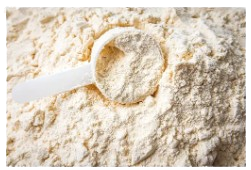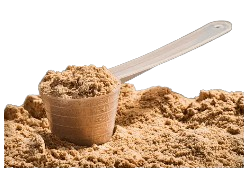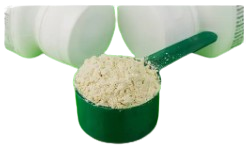Whey protein powder is a popular supplement that many fitness enthusiasts and health-conscious individuals turn to for boosting their protein intake. Known for its high-quality protein and rapid absorption, whey protein powder plays a crucial role in muscle growth, recovery, and overall wellness. Whether you’re looking to build muscle, manage weight, or enhance your daily protein consumption, understanding the different types of whey protein powder and their benefits can help you make the most informed choice. This guide will explore the key aspects of whey protein powder, from its various forms to potential side effects, ensuring you have all the information you need to select the best option for your needs.
Table of Contents
What is Whey Protein Powder?
Whey protein powder is a popular dietary supplement derived from whey, the liquid byproduct of cheese production. It is highly valued for its high protein content, rapid digestion and rapid absorption rate, making it favorite among athletes, bodybuilders, and fitness enthusiasts.
It also has Leucine a vital branched-chain amino acid (BCAA) found in high concentrations and plays a crucial role in muscle protein synthesis, making it an essential component for anyone looking to build or maintain muscle mass.
Leucine works by activating the mTOR pathway, a key regulatory pathway in the body that signals muscle cells to begin synthesizing protein. This process is essential for muscle repair and growth, especially after intense exercise. Consuming whey protein powder with its high leucine content can help maximize these anabolic effects, leading to better muscle gains and improved recovery times.
Benefits of Whey Protein Powder
Whey protein powder is widely recognized for its numerous health and fitness benefits. As a high-quality, complete protein source, it provides essential nutrients that support various aspects of well-being. Here are some of the key benefits of incorporating whey protein powder into your diet:
1. Muscle Growth and Recovery
One of the most notable benefits of whey protein powder is its ability to promote muscle growth and enhance recovery after exercise. Whey protein is rich in essential amino acids, particularly leucine, which is crucial for stimulating muscle protein synthesis. This makes it an excellent choice for athletes, bodybuilders, and anyone looking to increase muscle mass and strength.
2. Weight Loss and Fat Loss
Whey protein powder can aid in weight loss and fat reduction. High-protein diets help increase satiety, reduce hunger, and boost metabolism. By incorporating whey protein into your meals or as a supplement, you can help control your appetite, reduce overall calorie intake, and promote fat loss while preserving lean muscle mass.
3. Improved Immune Function
Whey protein powder contains immunoglobulins and lactoferrin, which are proteins that support the immune system. These components help strengthen the body’s defense mechanisms, making whey protein a valuable addition to your diet, especially during times of increased physical stress or when you need an immune boost.
4. Enhanced Nutrient Intake
Whey protein powder is an excellent source of high-quality protein that is easy to incorporate into your diet. It’s particularly beneficial for individuals who may struggle to meet their daily protein needs through whole foods alone, such as vegetarians, older adults, or those with busy lifestyles.
5. Blood Sugar Regulation
Some studies suggest that whey protein powder can help regulate blood sugar levels. It has been shown to reduce post-meal blood sugar spikes and improve insulin sensitivity, making it a useful supplement for individuals with type 2 diabetes or those at risk of developing the condition.
6. Cardiovascular Health
Whey protein powder may also have positive effects on cardiovascular health. Research indicates that it can help lower blood pressure in individuals with hypertension and improve lipid profiles by reducing Low Density Lipoprotein (LDL) levels. These benefits contribute to overall heart health and reduce the risk of cardiovascular diseases.
7. Convenience and Versatility
In addition to its health benefits, whey protein powder is incredibly convenient and versatile. It can be easily mixed into shakes, smoothies, or recipes, providing a quick and efficient way to boost your protein intake. Whether you’re at home, at the gym, or on the go, whey protein powder offers a practical solution for meeting your nutritional needs.
In summary, whey protein powder offers a wide range of benefits, from supporting muscle growth and weight loss to enhancing immune function and cardiovascular health. Its high-quality protein content and ease of use make it a valuable addition to any diet, helping you achieve your health and fitness goals effectively.
Types of Whey Protein Powder
Whey protein powder comes in several different forms, each with its unique characteristics and benefits. Understanding the differences between these types can help you choose the best whey protein powder for your specific needs and goals. The three main types of whey protein powder are Whey Protein Concentrate, Whey Protein Isolate, and Whey Protein Hydrolysate.
Whey Protein Concentrate (WPC)
Whey Protein Concentrate is the most basic form of whey protein powder. It undergoes minimal processing, which allows it to retain a higher amount of natural nutrients found in whey.
- Protein Content: Typically contains 70-80% protein by weight, with the remaining 20-30% consisting of fats, lactose (milk sugar), and other nutrients.
- Benefits: WPC is rich in beneficial compounds such as immunoglobulins and lactoferrin, which support immune function and overall health. It also has a pleasant taste and is cost-effective.
- Best Use Cases: Ideal for those looking to increase their protein intake without significantly increasing their budget. Suitable for general fitness, muscle maintenance, and recovery.
Whey Protein Concentrate

Whey Protein Isolate (WPI)
Whey Protein Isolate undergoes additional processing to remove most of the fats and lactose, resulting in a higher protein content and a more refined product.
- Protein Content: Contains 90% or more protein by weight, with minimal fats and lactose.
- Benefits: WPI is an excellent choice for individuals who are lactose intolerant or those seeking a low-fat, low-carbohydrate protein option. It is rapidly absorbed, making it ideal for post-workout recovery.
- Best Use Cases: Suitable for athletes, bodybuilders, and those with lactose intolerance. Perfect for lean muscle growth and recovery.
Whey Protein Isolate

Whey Protein Hydrolysate (WPH)
Whey Protein Hydrolysate is the most advanced form of whey protein powder. It undergoes a process called hydrolysis, which breaks down the protein into smaller peptides, making it easier and faster to digest.
- Protein Content: Similar to WPI, with 90% or more protein by weight.
- Benefits: WPH is the fastest absorbing form of whey protein, making it highly effective for immediate post-workout nutrition. It is also less likely to cause allergic reactions and is often used in medical protein supplements and infant formulas.
- Best Use Cases: Ideal for post-workout recovery, individuals with digestive issues, and those who require a highly bioavailable protein source.
Whey Protein Hydrolysate

How to Choose the Best Whey Protein Powder for You
Choosing the best whey protein powder can seem overwhelming with the variety of options available on the market. However, by considering your specific dietary needs, fitness goals, and budget, you can find the perfect whey protein powder to meet your needs. Here are some key factors to consider:
1. Determine Your Dietary Needs
Understanding your dietary requirements is crucial when selecting a whey protein powder. If you are lactose intolerant or have a sensitivity to dairy, you may want to opt for Whey Protein Isolate (WPI) or Whey Protein Hydrolysate (WPH), as these contain lower levels of lactose compared to Whey Protein Concentrate (WPC). Additionally, if you follow a low-carb or low-fat diet, Whey Protein Isolate or Whey Protein Hydrolysate would be more suitable due to their minimal fat and carbohydrate content.
2. Assess Your Fitness Goals
Your fitness goals play a significant role in determining the best whey protein powder for you.
- For Muscle Growth and Recovery: If your primary goal is to build muscle and enhance recovery, Whey Protein Concentrate or Whey Protein Isolate are excellent choices due to their high protein content and amino acid profiles.
- For Weight Loss: If you’re aiming to lose weight, choose a whey protein powder with a high protein content and low calories. Whey Protein Isolate is ideal for this purpose, as it provides high protein with minimal calories from fats and carbohydrates.
- For Rapid Absorption: If you need a fast-digesting protein for post-workout recovery, Whey Protein Hydrolysate is the best option. Its hydrolyzed form allows for quick absorption, delivering amino acids to your muscles rapidly.
3. Read and Understand Labels
When selecting a whey protein powder, it’s essential to read and understand the labels. Look for the following information:
- Protein Content: Check the protein content per serving to ensure it meets your requirements.
- Ingredients List: Avoid products with unnecessary additives, fillers, or artificial ingredients.
- Nutritional Profile: Examine the amounts of fats, carbohydrates, and sugars to make sure they align with your dietary goals.
4. Consider Trusted Brands
Choose whey protein powders from reputable brands known for their quality and transparency. Trusted brands often provide third-party testing results and certifications to ensure the purity and potency of their products. Reading reviews and seeking recommendations from fitness professionals can also help you identify reliable options.
5. Evaluate Cost and Value
While cost is an important factor, it should not be the sole determinant. Consider the value you’re getting for your money. A higher-priced whey protein powder with superior quality, better ingredients, and higher protein content may offer better value in the long run compared to a cheaper alternative with lower quality.
6. Try Different Products
Sometimes, finding the best whey protein powder requires some experimentation. Don’t be afraid to try different types and brands to see which one works best for you. Pay attention to how your body responds, including digestion, taste preferences, and overall effectiveness in helping you achieve your fitness goals.
In summary, choosing the best whey protein powder involves considering your dietary needs, fitness goals, understanding labels, opting for trusted brands, evaluating cost and value, and being open to trying different products. By taking these factors into account, you can find a whey protein powder that effectively supports your health and fitness journey.
Certification with GMP and NSF
When choosing a whey protein powder, it’s essential to consider certifications that ensure the product’s quality, safety, and manufacturing standards. Two critical certifications to look for are GMP (Good Manufacturing Practices) and NSF (National Sanitation Foundation). These certifications provide assurance that the whey protein powder you select meets high standards of quality and safety.
Good Manufacturing Practices (GMP) Certification
GMP certification is a system that ensures products are consistently produced and controlled according to quality standards. It covers all aspects of production, from the raw materials used to the hygiene of staff and facilities.
- Quality Assurance: Products with GMP certification are manufactured in facilities that follow stringent quality control measures. This reduces the risk of contamination, errors, and inconsistencies in the final product.
- Safety: GMP-certified facilities adhere to strict safety protocols, ensuring that the whey protein powder is safe for consumption. This includes thorough testing of raw materials and final products for harmful substances.
- Traceability: GMP certification requires detailed documentation and record-keeping, which allows for complete traceability of each product batch. This means any issues can be quickly identified and addressed.
National Sanitation Foundation (NSF) Certification
NSF certification is an independent, third-party certification that tests and verifies that products meet public health and safety standards. For dietary supplements like whey protein powder, NSF certification is particularly important.
- Product Testing: NSF conducts rigorous testing of products to verify that they contain the ingredients listed on the label and do not contain harmful levels of contaminants. This includes testing for heavy metals, pesticides, and other toxins.
- Facility Inspections: NSF certification involves regular inspections of manufacturing facilities to ensure they meet high standards of cleanliness and quality control.
- Consumer Trust: Products with NSF certification are trusted by consumers for their safety and quality. This certification is recognized globally and provides confidence that the whey protein powder you choose is reliable and safe.
Importance of GMP and NSF Certifications
Choosing a whey protein powder with GMP and NSF certifications offers several benefits:
- Peace of Mind: Knowing that your whey protein powder has been produced in a facility that adheres to strict quality and safety standards gives you confidence in the product.
- Quality Assurance: GMP and NSF certifications ensure that the product you are consuming is of high quality, free from contaminants, and accurately labeled.
- Informed Choice: These certifications allow you to make an informed decision, knowing that the product has been independently verified for safety and quality.
In summary, selecting a whey protein powder with GMP and NSF certifications ensures that you are choosing a product that meets high standards of quality, safety, and manufacturing practices. These certifications provide peace of mind and confidence that the whey protein powder you incorporate into your diet is both safe and effective.
Understanding Proprietary Blends in Whey Protein Powder
When selecting a whey protein powder, you might come across products labeled as containing “proprietary blends.” Understanding what proprietary blends are and their implications can help you make a more informed choice about your supplements.
What are Proprietary Blends?
A proprietary blend is a unique combination of ingredients formulated by a manufacturer. The specific amounts of each ingredient within the blend are not disclosed to the consumer; instead, only the total weight of the blend is listed on the product label. This means you won’t know the exact dosage of each component included in the blend.
Why Manufacturers Use Proprietary Blends
Manufacturers use proprietary blends for several reasons:
- Formula Protection: By not disclosing the exact amounts of each ingredient, companies protect their unique formulations from being copied by competitors.
- Marketing Appeal: Proprietary blends can be marketed as special or exclusive, giving the impression that they offer unique benefits.
Potential Concerns with Proprietary Blends
While proprietary blends can offer unique formulations, they also come with some drawbacks:
- Lack of Transparency: Without knowing the exact amounts of each ingredient, it’s challenging to assess the effectiveness and safety of the product. This lack of transparency can be a red flag for consumers who want to know precisely what they are consuming.
- Ingredient Underdosing: Some manufacturers might use proprietary blends to mask the fact that the product contains lower amounts of key ingredients than necessary for effectiveness. This practice can lead to ineffective doses that do not provide the desired benefits.
- Difficulty in Comparison: Proprietary blends make it hard to compare products accurately. Without knowing the specific quantities of each ingredient, you can’t determine which product offers the best value or the most effective formulation.
How to Approach Proprietary Blends in Whey Protein Powder
When considering whey protein powders with proprietary blends, here are a few tips to help you make an informed decision:
- Research the Brand: Choose reputable brands known for their transparency and quality control. Trusted brands are more likely to use proprietary blends responsibly and provide effective formulations.
- Look for Third-Party Testing: Products that have been third-party tested for quality and potency can offer some assurance that the proprietary blend is effective and safe.
- Check for Certifications: Certifications like GMP (Good Manufacturing Practices) and NSF (National Sanitation Foundation) can indicate that the product is manufactured to high standards, even if it contains proprietary blends.
- Evaluate the Ingredient List: While the exact amounts are not disclosed, you can still review the ingredients in the blend. Look for high-quality, scientifically backed ingredients and avoid blends that contain a lot of fillers or unproven components.
In summary, proprietary blends in whey protein powder can offer unique formulations but also pose challenges due to the lack of transparency and potential for underdosing. By researching the brand, looking for third-party testing, checking for certifications, and evaluating the ingredient list, you can make a more informed choice about whether a product with a proprietary blend is right for you.
Potential Side Effects and Considerations of Whey Protein Powder
While whey protein powder is a popular supplement for muscle growth, recovery, and overall health, it’s important to be aware of potential side effects and considerations. Understanding these can help you use whey protein powder safely and effectively.
Common Side Effects
- Digestive Issues:
- Lactose Intolerance: Whey protein powder contains lactose, a type of sugar found in milk. People who are lactose intolerant may experience bloating, gas, or diarrhea when consuming whey protein. Opting for Whey Protein Isolate (WPI) or Whey Protein Hydrolysate (WPH), which have lower lactose content, can help alleviate these issues.
- Gastrointestinal Discomfort: Some individuals may experience general gastrointestinal discomfort, such as nausea or stomach cramps. This can sometimes be due to consuming too much protein at once or an intolerance to specific ingredients in the whey protein powder.
- Allergic Reactions:
- Milk Allergy: Whey protein is derived from milk, so individuals with a milk allergy should avoid whey protein powder. An allergic reaction can cause symptoms ranging from mild (rash, itching) to severe (hives, difficulty breathing).
- Kidney Function:
- Excessive Protein Intake: Consuming excessive amounts of whey protein can put additional strain on the kidneys, particularly in individuals with pre-existing kidney conditions. It’s important to adhere to recommended serving sizes and consult with a healthcare provider if you have any kidney concerns.
Considerations When Using Whey Protein Powder
- Quality and Purity:
- Product Quality: Choose whey protein powders from reputable brands that are transparent about their ingredients and manufacturing practices. Look for products that are certified by organizations like GMP (Good Manufacturing Practices) or NSF (National Sanitation Foundation) to ensure quality and safety.
- Ingredient List: Review the ingredient list for any artificial additives, sweeteners, or fillers that may not align with your dietary preferences or health goals.
- Dosage and Timing:
- Recommended Serving Size: Stick to the recommended serving size provided on the product label to avoid overconsumption. Excessive protein intake can lead to unwanted side effects and may not provide additional benefits.
- Timing: For optimal results, consume whey protein powder around your workout times—either before or after exercise. This helps with muscle recovery and growth, but ensure it fits into your overall daily protein intake.
- Interactions with Medications:
- Consult Your Healthcare Provider: If you are on medication or have any health conditions, consult with a healthcare provider before starting whey protein powder. Some medications or conditions might interact with high protein intake.
- Individual Tolerance:
- Personal Response: Everyone’s body responds differently to supplements. Start with a small amount of whey protein powder to assess your tolerance and gradually increase if you experience no adverse effects.
In summary, while whey protein powder offers many benefits, it is important to be aware of potential side effects such as digestive issues, allergic reactions, and the impact on kidney function. By choosing high-quality products, adhering to recommended dosages, considering interactions with medications, and monitoring your personal response, you can use whey protein powder safely and effectively to support your health and fitness goals.
Conclusion
Whey protein powder stands out as a versatile and effective supplement for a range of health and fitness goals. With its high-quality protein content, rapid digestion, and numerous benefits including muscle growth, weight management, and immune support, whey protein powder can be a valuable addition to your diet.
Choosing the best whey protein powder involves understanding the different types available, such as Whey Protein Concentrate, Whey Protein Isolate, and Whey Protein Hydrolysate, each with its unique advantages. By considering your dietary needs, fitness goals, and reviewing product certifications like GMP and NSF, you can make an informed decision that aligns with your personal health requirements.
Be aware of potential side effects and considerations, such as digestive issues, lactose intolerance, and quality of the product. Go for reputable brands, monitor your individual tolerance, and consult with a healthcare provider if needed to ensure you get the most benefit from whey protein powder.
In summary, whey protein powder offers a convenient and effective way to enhance your protein intake, support muscle recovery, and achieve your fitness goals. By selecting the right type and being mindful of quality and potential side effects, you can harness the full potential of whey protein powder to support your overall health and well-being.


